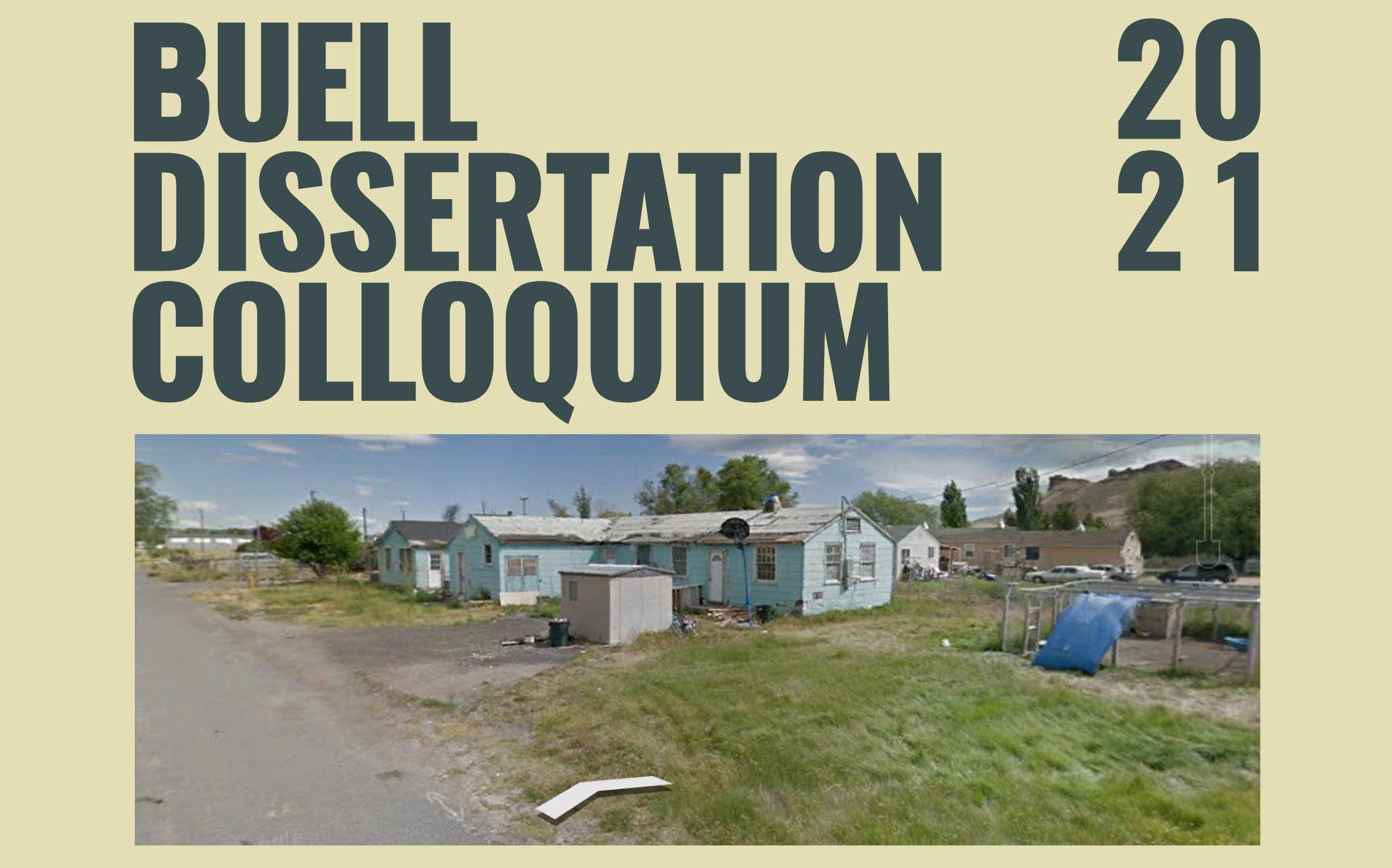
April 23, 2021, 9:00am — 6:30pm EST
The Temple Hoyne Buell Center for the Study of American Architecture's biennial Dissertation Colloquium brings together a select group of doctoral students from diverse institutional and disciplinary backgrounds working on dissertation topics related to the history, theory, and criticism of American architecture, urbanism, and landscape. The Colloquium has been held for nearly a quarter-century, and its purpose is to provide a forum for discussing significant new work by emerging scholars. Much of the event's long and distinguished history, which includes early work of many of the field's established scholars, is available for perusal online here.
Schedule (Eastern Standard Time):
9:00 — Introduction | Reinhold Martin, Buell Center
Panel 1
9:10 — "South Centralities: Brazil's Lusotropicalist Architecture" | Ana Ozaki, Cornell University, History of Architecture and Urban Development
9:30 — "Black Concrete Power: The Tuskegee Block and Low Cash-Cost Housing" | Vyta Pivo, George Washington University, American Studies
9:50 — "Building Branqueamento: Architectures of Racial Capitalism in the Belle Époque Atlantic World" | David Sadighian, Harvard University, History of Art and Architecture
10:10 — "Unsettling Canada's Infrastructure Histories: Tashme and the Residual Road Camps of Highway 3 in British Columbia" | Desirée Valadares, University of California, Berkeley, Architecture — History, Theory, and Society
10:30 — Response | Ateya Khorakiwala, Columbia University, Graduate School of Architecture, Planning, and Preservation
10:50 — Discussion
Panel 2
11:25 — "Of Houses and Sputniks. Ada Louise Huxtable's 1967 Narrative of Soviet Architecture: Negotiations between Experience, Representation, and Expectations" | Valeria Casali, Politecnico di Torino, Architecture, History, and Project
11:45 — "The Architect as Problem Solver: Cultural Techniques and Cardboard Models in Eero Saarinen & Associates, 1957–1959" | Jia Yi Gu, University of California, Los Angeles, Architecture
12:05 — "The Scale of Apocalypse: Paolo Soleri's Nuclear Revelation" | Eliyahu Keller, MIT, History, Theory, and Criticism of Architecture
12:25 — "Conditioning Art, Air, and Action: The Object Condition Report in the Modern Museum" | Nushelle de Silva, MIT, History, Theory, and Criticism of Architecture
12:45 — Response | Lucia Allais, Columbia University, Graduate School of Architecture, Planning, and Preservation
1:05 — Discussion
Panel 3
2:15 — "Rights of Nature and the Buen Vivir: Rhetoric and Realities of Guayaquil Ecológico Urban Regeneration Project. A Critical Review" | Maria Fernanda Ordóñez, University of Leuven, Department of Architecture
2:35 — "Landscapes of the Shifting Wages of Whiteness: Postwar Homesteading in the Shadow of Japanese American Incarceration, 1946-1981" | Nicole G. Sintetos, Brown University, American Studies
2:55 — "Beyond the Absence: Recovering the Architectural Imprints of Slavery" | Kathleen Powers Conti, University of Texas at Austin, Historic Preservation and Architectural History
3:15 — "AIDS and the City: Pandemic Activism, Urban Politics, and the 'Desexualization' of San Francisco" | Stathis G. Yeros, University of California, Berkeley, Architecture — History, Theory, and Society
3:35 — Response | Jorge Otero-Pailos, Columbia University, Graduate School of Architecture, Planning, and Preservation
3:55 — Discussion
Concluding Roundtable | "Provincializing America"
In recent years, historical scholarship on architecture has taken an importantly “global” turn. Research on the United States and on the Americas more broadly has been no exception. To this has been added innovative work on themes such as the history of slavery and of anti-Black racism that can be said to “provincialize” America from within. New objects, new voices, and new archives have entered the historical conversation, including work showcased in this edition of the Buell Dissertation Colloquium. These years have also seen the strengthening of PhD programs in architectural history and theory as well as the growth of college curricula in architectural studies. Nonetheless, the critical humanities have suffered from chronic underfunding and institutional neglect, from which architectural history has not been exempt. Nor has the field adequately redressed racial and other inequities placed in stark relief by the global pandemic. At this moment of stocktaking and reckoning, what is to be done?
4:30 — Introduction | Charles Davis (University of Buffalo) + Meredith TenHoor (Pratt Institute), Buell Center Advisory Board
4:40 — Greg Castillo, University of California, Berkeley
4:50 — Joy Knoblauch, University of Michigan
5:00 — Fernando Lara, University of Texas, Austin
5:10 — Discussion
6:30 — Conclusion
The new Buell Dissertation Colloquium graphic identity is designed by Johnelle Smith, featuring an image from Nicole Sintetos: A home in California's Tule Lake Basin, located on the old grounds of a Japanese American WWII Segregation Center. Screen Capture from Google Earth, 2021.
